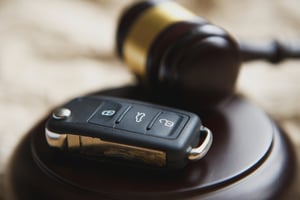
When you file bankruptcy, it can be a complex and emotional process, especially when it involves surrendering a car. If you’re struggling with car payments or owe more on your car loan than the vehicle is worth, surrendering it during bankruptcy might be a viable option. This comprehensive guide will help you understand the process, potential benefits, and considerations for surrendering a car in bankruptcy in Minnesota.
Understanding Car Loan Surrender in Bankruptcy
Surrendering a car in bankruptcy means giving up your ownership interest in the vehicle to the lender or leaseholder in exchange for discharging the remaining balance on the loan or lease. This is typically done when the car has negative equity (i.e., you owe more than the car is worth) or when the car payments are no longer affordable. This process is a part of your overall bankruptcy case and affects the outcome of your debts.
Chapter 7 Bankruptcy vs. Chapter 13 and Car Surrender
In Minnesota, you have two primary options for filing for bankruptcy: Chapter 7 and Chapter 13. The chapter you choose will influence how your car is handled.
-
Chapter 7 Bankruptcy: In Chapter 7, surrendering a car with negative equity is often straightforward. The bankruptcy trustee will typically abandon the vehicle, allowing the lender to repossess it. This eliminates the debt associated with the car, providing debt relief. However, if your car has equity, the trustee might sell it to repay your creditors.
-
Chapter 13 Bankruptcy: In Chapter 13, you propose a bankruptcy plan to the bankruptcy court, which may include modified payments on your car loan as part of the Chapter 13 bankruptcy plan. If you decide to surrender the car, it’s crucial to inform the trustee and your car creditor early in the process. The trustee will assess the car’s value and determine how it affects your bankruptcy plan.
Understanding the Consequences of Missing Car Payments and Car Surrender
While surrendering a car in bankruptcy can offer relief from debt, it’s important to understand the potential consequences:
-
Deficiency Balance: If the sale of your surrendered car doesn’t cover the entire loan balance, you might be liable for a deficiency balance. However, in most cases, this deficiency is discharged in bankruptcy, meaning you receive a bankruptcy discharge and no longer have to pay it.
-
Credit Report Impact: Surrendering a car will appear on your credit report, but the impact is usually less severe than a repossession. Over time, you can rebuild your credit by making timely payments on other bills.
-
Transportation Needs: If you rely on your car for work or daily life, surrendering it might create transportation challenges. Consider alternative transportation options like public transport, carpooling, or purchasing a more affordable vehicle after your bankruptcy is discharged.
Minimizing Risk and Maximizing Benefits
To minimize risk and maximize the benefits of surrendering a car in bankruptcy, consider these tips:
-
Review Your Loan Contract: Understand the terms of your loan contract, including any early termination fees or penalties that might apply when surrendering the car.
-
Calculate Your Car’s Equity: Determine how much equity (if any) you have in your car. This information is crucial for deciding whether to surrender the car or explore other options.
-
Consult with a Bankruptcy Attorney: An experienced bankruptcy attorney in Minnesota can help you understand the implications of surrendering your car, assess your options, and guide you through the process to ensure your interests are protected. Ensure that your bankruptcy filing accounts for all reasonable and necessary expenses to maintain financial stability post-bankruptcy.
Leased Cars and Bankruptcy
If you’re leasing a car, the process of surrendering your car lease is slightly different. You’ll need to notify the leaseholder of your intent to reject the lease as part of your bankruptcy filing. You might also be liable for early termination fees or excess mileage charges, but these are typically discharged in bankruptcy.
The Bankruptcy Trustee Process and Car Surrender
The process for surrendering a car in bankruptcy generally follows these steps:
-
File for Bankruptcy: You’ll need to file bankruptcy for either Chapter 7 or Chapter 13. When you file bankruptcy, it's crucial to understand the decision-making process and the consequences of keeping or surrendering your vehicle. Chapter 7 is a liquidation bankruptcy where non-exempt assets, including cars with significant equity, might be sold to repay creditors. Chapter 13 is a reorganization bankruptcy where you create a repayment plan to address your debts, including car loans. The implications on auto loan debt and the process of surrendering a vehicle are significant factors to consider.
-
Notify the Lender: Inform your car lender or leaseholder of your intent to surrender the vehicle. This is typically done through a written notice, although some lenders might require specific forms or procedures.
-
Arrange for Surrender: Coordinate with the lender to either drop off the car at an agreed-upon location or have them pick it up from you. Make sure to document the date and time of surrender, as well as any communication with the lender.
-
Update Bankruptcy Documents: Your bankruptcy attorney will update your bankruptcy schedules to reflect the surrendered car and the discharged debt.
-
The Automatic Stay: Once you file for bankruptcy, an automatic stay goes into effect, protecting you from creditor actions, including car repossession. This means the lender cannot take your car without permission from the bankruptcy court.
Reaffirmation Agreements: A Potential Alternative
In some cases, you might consider reaffirming your car loan instead of surrendering the vehicle. A reaffirmation agreement is a contract between you and the lender where you agree to continue making payments on the loan as if you weren't in bankruptcy. This allows you to keep the car, but it also means you'll remain personally liable for the debt if you default on payments.
Post-Bankruptcy Considerations
After surrendering your car in bankruptcy, your credit report will reflect the bankruptcy discharge of the debt, which may temporarily impact your credit score. However, this is usually a short-term setback, and you can start rebuilding your credit by making timely payments on other bills and debts.
Once your bankruptcy is discharged, you can explore financing options for a new car. However, be prepared for potentially higher interest rates due to the recent bankruptcy on your credit report.
Seeking Professional Guidance
Surrendering a car in bankruptcy involves navigating complex legal procedures and making informed financial decisions. An experienced bankruptcy attorney can guide you through the process, identify potential issues, and ensure your rights are protected. They can also help you explore alternatives to surrender, such as reaffirmation agreements or negotiating with the lender to modify your loan terms.
If you're considering surrendering your car in bankruptcy, don't hesitate to seek professional legal advice. An attorney can provide you with personalized guidance tailored to your unique circumstances, helping you achieve the best possible outcome for your financial future.
LifeBack Law Firm: Your Trusted Partner in Minnesota Bankruptcy
At LifeBack Law Firm, we understand the challenges and complexities of bankruptcy. Our experienced bankruptcy attorneys are dedicated to helping Minnesotans find financial relief and fresh starts.
If you're considering surrendering a car in bankruptcy or have questions about the process, don't hesitate to contact us for a free consultation. We'll assess your situation, explain your options, and help you make informed decisions about your financial future.
To learn more about the process of surrendering a car in a bankruptcy, you should consult with an experienced bankruptcy attorney. See us at LifeBackLaw.com
Top 7 FAQs about Surrendering a Car in Bankruptcy (Minnesota):
Can I keep my car if I file for bankruptcy in Minnesota?
Whether you can keep your car depends on several factors, including the type of bankruptcy you file (Chapter 7 or Chapter 13), the amount of equity in your car, and your ability to make payments on the car loan. In some cases, you may be able to keep your car by reaffirming the debt or including it in your Chapter 13 repayment plan. However, if you owe more than the car is worth or cannot afford the payments, surrendering the car might be the best option.
What happens to my car loan if I surrender my car in bankruptcy?
When you surrender a car in bankruptcy, the remaining balance on the car loan is typically discharged (wiped out). However, if the sale of the car doesn't cover the entire loan amount, you might be liable for a deficiency balance. In most Chapter 7 bankruptcy cases, this deficiency is also discharged.
Will surrendering my car in bankruptcy ruin my credit?
While surrendering a car will appear on your credit report, it's usually less damaging than a repossession. Your credit score will likely drop temporarily, but you can start rebuilding it by making timely payments on other bills.
How do I surrender my car in bankruptcy in Minnesota?
The process involves notifying your car lender or leaseholder of your intent to surrender the vehicle, coordinating a time and place for the surrender, and updating your bankruptcy documents accordingly. It's crucial to consult with a bankruptcy attorney in Minnesota to guide you through the legal procedures and protect your rights.
Can I sell my car instead of surrendering it in bankruptcy?
Yes, you can sell your car before or during bankruptcy. If you sell it before filing, you can use the proceeds to pay off other debts. If you sell it during bankruptcy, you'll need to get approval from the bankruptcy trustee and the court.
Can I surrender a leased car in bankruptcy?
Yes, you can surrender a leased car in bankruptcy. You'll need to notify the leaseholder of your intent to reject the lease as part of your bankruptcy filing. You might be liable for early termination fees or excess mileage charges, but these are typically discharged in bankruptcy.
What are the benefits of surrendering a car in bankruptcy?
Surrendering a car in bankruptcy can provide relief from high car payments, eliminate negative equity, and free up your budget for other necessary expenses. It can also help you achieve a fresh financial start and focus on rebuilding your financial well-being.




